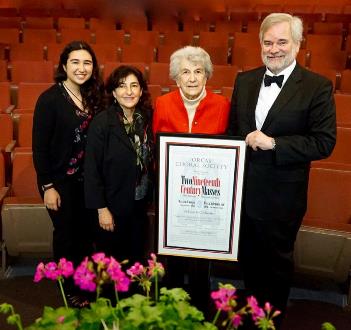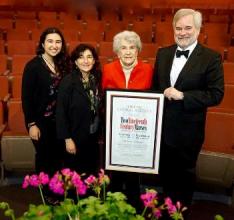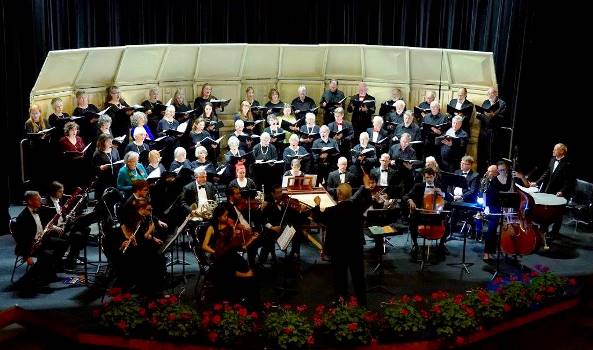— by Melinda Bargreen —
“Two Nineteenth Century Masses,” presented by Orcas Choral Society, with orchestra and soloists under the direction of conductor Roger Sherman; St. Mark’s Cathedral, May 1.
(Editor’s note: The Orcas Choral Society performed Schubert’s D. 167 Mass and Storch’s Missa Solemnis on Orcas Island on April 23 and 24. At the final Orcas performance, retiring OCS Artistic Director Roger Sherman was honored, as was Laila Storch, Aloysia Friedmann and Sophie Parker, the great-great-grandaughter, great-great-great-grandaughter and great-great-great-great grandaughter of composer Alois Storch. The photos are from that event).
–by Melinda Bargreen–
In the world of classical music, it is easy to develop a sort of “tunnel vision” that focuses almost exclusively on the top tier of fully professional ensembles – orchestra, chamber, choral, operatic.
And sometimes we forget about the very great degree of pleasure that can come from music organizations outside of the “majors,” particularly when the performances are polished and the repertoire is intriguing.
You can’t get much more intriguing than an 1826 Missa Solemnis, unearthed from a box of manuscripts in possession of the great-great-granddaughter of Prague pharmacist and composer Alois Storch, performed in possibly its first production by the Orcas Choral Society under the direction of Roger Sherman. Following two concerts April 23 and 24 on Orcas Island, the Orcas Choral Society and an orchestra of Orcas and Seattle-area players arrived in St. Mark’s Cathedral for the Seattle premiere May 1.
A large and receptive crowd was on hand in the Cathedral, a space perfectly suited to this production – with its resonant acoustics, its lengthy reverb, and the sense of majesty that accorded well with the repertoire. The Storch Missa Solemnis in C Major was paired with a better-known, early Mass in G Major (D.167) of Storch’s famous contemporary Franz Schubert for this program.
We know that Schubert composed his D.167 Mass at the age of 18, in a five-day burst of inspiration. We have no idea how long it took Storch to complete his somewhat longer Missa Solemnis, or whether it was ever performed during his lifetime. But hearing the two masses side by side made it clear that Storch’s work was eminently worthy of this pairing; that it is an inventive and imaginative composition, and that the orchestral scoring makes adept and creative use of a surprising spectrum of brass and winds and timpani. The word-painting is highly colorful, with a triumphant “Et resurrexit” to contrast with the poignant “Et incarnatus est.”
Some of the chord progressions are a bit exotic, even startling, and there were some ear-opening modulations in the “Dona nobis pacem” before the final fugue. The choral writing is so high (including high Cs for the sopranos, virtually unheard-of in repertoire of this genre) that some choruses may need to equip themselves with a helium tank for inhalation before certain stratospheric passages. (This expedient was not necessary in the Seattle performance, however.) But as a whole, the Storch Missa Solemnis is a remarkable success – one that bodes well for a planned resuscitation and transcription of more works from the large box of manuscripts inherited by the composer’s great-great granddaughter, the oboist and author Laila Storch.
Roger Sherman’s clear, expressive conducting was a key factor in the success of the performance, drawing a good, solid sound from the expressive chorus and a well-balanced, responsive orchestra. The vocal soloists included soprano Sharon Abreu, alto Ginni Keith, tenor Stephen Rumph, and bass John Heath. Abreu’s soprano was remarkable for its clarity, even at high altitudes, and Rumph was an absolute standout in his virtuoso solos, which were negotiated with an almost operatic zest.

From left, Sophie Parker, Aloysia Friedmann, Laila Storch and Roger Freeman at performance of Alois Storch’s “Missa Solemnis”
It was Laila Storch’s husband, the violinist Martin Friedmann, who made it his goal to bring her great-great-grandfather’s music out of the box and into the concert hall. And it was composer/conductor Adam Stern who deserves kudos for his painstaking transcription of the handwritten manuscript into modern notation software that made the printing of readable orchestral and choral scores possible. A chorus of “bravos” to all of them, and to the spirited performers who brought these long-silent notes to vivid life.
https://www.melindabargreen.com/Melinda_Bargreen/Some_Recent_Reviews.html
(Editor’s note: Melinda Bargreen writes at https://www.melindabargreen.com/ Her new book, Classical Seattle, is available at Amazon.com and the usual outlets. It was published last October and favorably reviewed by Aloysia Friedmann and Jon Kimura Parker)
**If you are reading theOrcasonian for free, thank your fellow islanders. If you would like to support theOrcasonian CLICK HERE to set your modestly-priced, voluntary subscription. Otherwise, no worries; we’re happy to share with you.**










I love Melinda’s use of the words “altitude” and “stratospheric” to describe the soprano’s agility in the high passages of the Storch (kudos to them!) The altos only had to touch high E a few times…easily attainable.
The photo of the 3 generations reminds me of the special OICMF fund-raising program in 2014 at the Moran Mansion where Jackie, Martin, Aloysia, Sophie and Laila (oboe) played a piece together……so special!